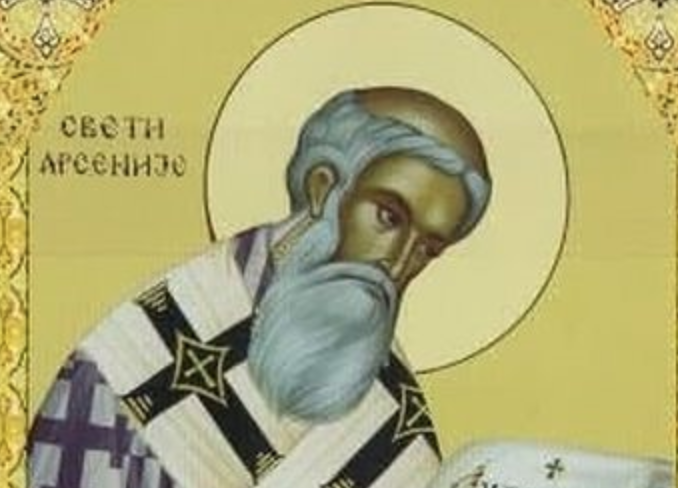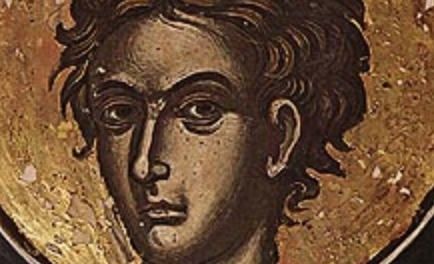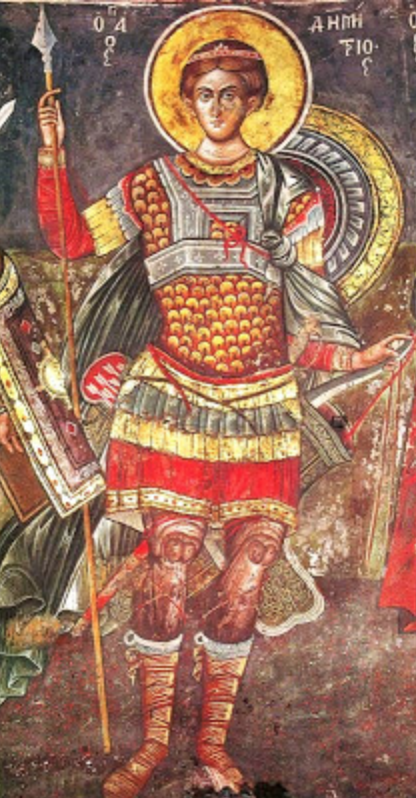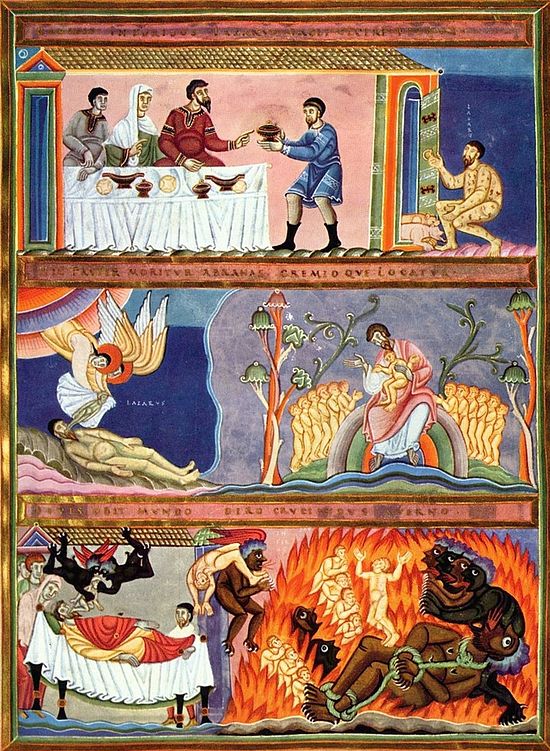Life & Faith
November 1: Saints Cosmas and Damian the Holy Unmercenaries and their Mother Theodota
Cosmas and Damian were unmercenaries and miracle-workers. They were brothers both in the flesh and in the spirit, born somewhere in Asia Minor of a pagan father and a Christian mother. After their father’s death, their mother Theodota devoted all her time and effort to educating her sons and raising them as true Christians. God helped her, and her sons matured as sweet fruit and luminaries of the world. They were learned in the art of medicine and ministered to the sick without payment, not so much with medicine as by the name of the Lord Jesus Christ. They were called “unmercenary physicians,” that is, unpaid physicians, for they healed freely and thus fulfilled the commandment of Christ: Freely ye have received, freely give (Matthew 10:8). So careful were they in healing men free of charge that Cosmas became very angry with his brother Damian because he accepted three eggs from a woman, Palladia, and ordered that he not be buried alongside his brother Damian after his death. In fact, St. Damian did not accept these three eggs as a reward for healing the ailing Palladia, but rather because she adjured him in the name of the Most-holy Trinity to accept these three eggs. Nevertheless, after their death in the town of Fereman, they were buried together according to a revelation from God. The holy brothers were great miracle-workers both during their life and after their death. A snake crawled through the mouth and into the stomach of a certain farm laborer during his sleep, and the unfortunate man would have died in the greatest pain had he not, in the last moment, invoked the help of Saints Cosmas and Damian. Thus, the Lord glorified forever the miracle-working of those who glorified Him on earth by their faith, purity and mercy.
Venerable Dragutin (Theoctistus in Monasticism) of Serbia
Saint Dragutin was the brother of Saint Stephen Milutin, the son of King Stephen Urosh I, and the grandson of First-Crowned King Saint Stephen (September 24). Dragutin, a true Christian, after a short reign, abdicated in favor of his brother Stephen. He withdrew to Srem, secretly living as an ascetic in a grave which he dug with his own hands. During his righteous life, Saint Dragutin toiled much over converting the Bogomil heretics to the true Faith. He surrendered his soul to God on March 2, 1316.
St Arsenije Of Srem, The Second Archbishop Of Serbia
 St. Arsenije, the second archbishop of Serbia, was the most ascetic of the brotherhood and the most responsible student of Saint Sava. Regarding his spiritual development, the founder of the autocephalous Serbian church was particularly concerned for and tried to protect his spirit. He would successfully develop the young serbian archbishop, which was crucial for the serbian state and its public life throughout the middle ages. In his history, the excellent biography written by the archbishop Danilo II, he states that St. arsenije was a native of srem, of which historical records show that the medieval territory included present-day Srem and Posavina, the Kolubara valley, all the way to the regions’ limits.
St. Arsenije, the second archbishop of Serbia, was the most ascetic of the brotherhood and the most responsible student of Saint Sava. Regarding his spiritual development, the founder of the autocephalous Serbian church was particularly concerned for and tried to protect his spirit. He would successfully develop the young serbian archbishop, which was crucial for the serbian state and its public life throughout the middle ages. In his history, the excellent biography written by the archbishop Danilo II, he states that St. arsenije was a native of srem, of which historical records show that the medieval territory included present-day Srem and Posavina, the Kolubara valley, all the way to the regions’ limits.
Martyr Nestor of Thessalonica
 The holy Martyr Nestor was very young in age, handsome in appearance, and he was known to the holy Great Martyr Demetrios (October 26), for he had instructed Nestor in the faith.
The holy Martyr Nestor was very young in age, handsome in appearance, and he was known to the holy Great Martyr Demetrios (October 26), for he had instructed Nestor in the faith.
The Emperor was visiting Thessaloniki, and he built a high platform in the midst of the city so that a gigantic barbarian named Lyaios could wrestle there and be seen by everyone. Beneath the platform many spears and other sharp weapons were placed pointing upward. When Lyaios defeated his opponents, he threw them down onto the spears and they died. Many Christians were forced to fight Lyaios, and were killed. When Nestor saw how Emperor Maximian rejoiced over the victories of his champion, he disdained his pride. Seeing the miracles of Saint Demetrios, however, he took courage and went to the prison where the holy Martyr was confined, and fell at his feet.
Holy, Glorious Demetrius the Myrrh-gusher of Thessalonica
 The Great Martyr Demetrius the Myrrh-gusher of Thessalonica was the son of a Roman proconsul in Thessalonica. Three centuries had elapsed and Roman paganism, spiritually shattered and defeated by the multitude of martyrs and confessors of the Savior, intensified its persecutions. The parents of Saint Demetrius were secretly Christians, and he was baptized and raised in the Christian Faith in a secret church in his father’s home.
The Great Martyr Demetrius the Myrrh-gusher of Thessalonica was the son of a Roman proconsul in Thessalonica. Three centuries had elapsed and Roman paganism, spiritually shattered and defeated by the multitude of martyrs and confessors of the Savior, intensified its persecutions. The parents of Saint Demetrius were secretly Christians, and he was baptized and raised in the Christian Faith in a secret church in his father’s home.
By the time Demetrius had reached maturity and his father had died, the emperor Galerius Maximian had ascended the throne (305). Maximian, confident in Demetrius’ education as well as his administrative and military abilities, appointed him to his father’s position as proconsul of the Thessalonica district. The main tasks of this young commander were to defend the city from barbarians and to eradicate Christianity. The emperor’s policy regarding Christians was expressed simply, “Put to death anyone who calls on the name of Christ.” The emperor did not suspect that by appointing Demetrius he had provided a way for him to lead many people to Christ.
Homily on the Rich man and Lazarus
 There was a certain rich man, which was clothed in purple and fine linen, and fared sumptuously every day: And there was a certain beggar named Lazarus, which was laid at his gate, full of sores, and desiring to be fed with the crumbs which fell from the rich man's table: moreover the dogs came and licked his sores. And it came to pass, that the beggar died, and was carried by the angels into Abraham's bosom: the rich man also died, and was buried; and in hell he lift up his eyes, being in torments, and seeth Abraham afar off, and Lazarus in his bosom. And he cried and said, Father Abraham, have mercy on me, and send Lazarus, that he may dip the tip of his finger in water, and cool my tongue; for I am tormented in this flame. But Abraham said, Son, remember that thou in thy lifetime receivedst thy good things, and likewise Lazarus evil things: but now he is comforted, and thou art tormented. And beside all this, between us and you there is a great gulf fixed: so that they which would pass from hence to you cannot; neither can they pass to us, that would come from thence. Then he said, I pray thee therefore, father, that thou wouldest send him to my father's house: For I have five brethren; that he may testify unto them, lest they also come into this place of torment. Abraham saith unto him, They have Moses and the prophets; let them hear them. And he said, Nay, father Abraham: but if one went unto them from the dead, they will repent. And he said unto him, If they hear not Moses and the prophets, neither will they be persuaded, though one rose from the dead.
There was a certain rich man, which was clothed in purple and fine linen, and fared sumptuously every day: And there was a certain beggar named Lazarus, which was laid at his gate, full of sores, and desiring to be fed with the crumbs which fell from the rich man's table: moreover the dogs came and licked his sores. And it came to pass, that the beggar died, and was carried by the angels into Abraham's bosom: the rich man also died, and was buried; and in hell he lift up his eyes, being in torments, and seeth Abraham afar off, and Lazarus in his bosom. And he cried and said, Father Abraham, have mercy on me, and send Lazarus, that he may dip the tip of his finger in water, and cool my tongue; for I am tormented in this flame. But Abraham said, Son, remember that thou in thy lifetime receivedst thy good things, and likewise Lazarus evil things: but now he is comforted, and thou art tormented. And beside all this, between us and you there is a great gulf fixed: so that they which would pass from hence to you cannot; neither can they pass to us, that would come from thence. Then he said, I pray thee therefore, father, that thou wouldest send him to my father's house: For I have five brethren; that he may testify unto them, lest they also come into this place of torment. Abraham saith unto him, They have Moses and the prophets; let them hear them. And he said, Nay, father Abraham: but if one went unto them from the dead, they will repent. And he said unto him, If they hear not Moses and the prophets, neither will they be persuaded, though one rose from the dead.
Always hungry, the suffering Lazarus wished to eat if only the crusts that fell from the rich man’s table, the ones that were thrown to the dogs before his very eyes, but apparently not even those were made available to him. No one pitied his sickness, no one bandaged his wounds, and the dogs licked them, which prevented them from healing. The unfortunate man died, the rich man also died, and after death their positions reversed. Each received his reward—Lazarus was carried up by angels to paradise, and the rich man was cast into hell. The rich man in his terrible torments remembered his wasted life; he could see the poor man Lazarus who suffered outside his gates and thus constantly reminded him of his sufferings, to which he nevertheless paid no attention and never helped him in any way. Wondering where that sufferer was now and what became of him, the rich man suddenly saw him standing with Abraham, and he begged, “Father Abraham! Send me Lazarus to ease my torment!” “My son!” replied Abraham, “Remember your life!”

